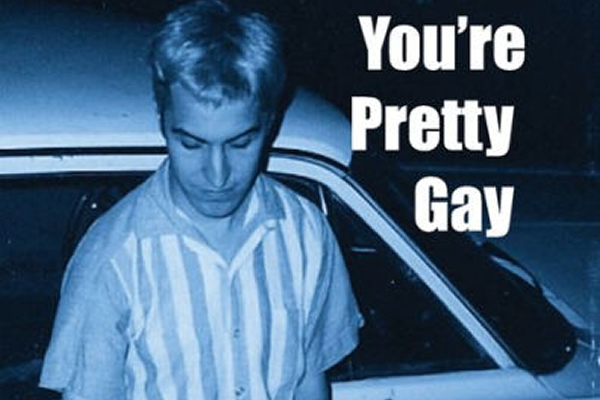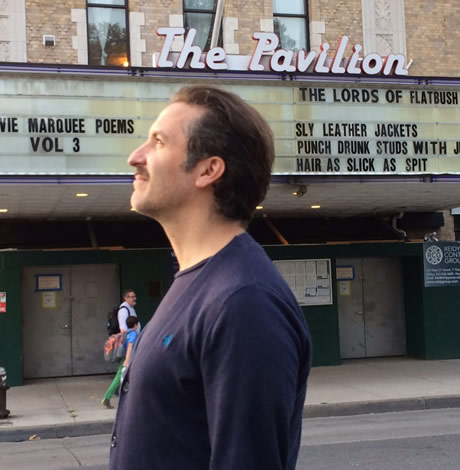Books
Drew Pisarra’s ‘dangerously funny and queerly inventive brain’
‘You’re Pretty Gay’ shatters expectations and social mores

Is there anything more absurd than this, wondered gay poet and writer Drew Pisarra. Pisarra, then, was an assistant to a paralegal at a toothpaste company.
Fiercely protective of the pattern on its toothpaste, they wrote letters to rivals who, they felt, were infringing on their copyright.
Even when their competitors were in countries in the middle of a civil war, “They would write back, ‘we can’t respond now, we’re in a war,’” Pisarra said.
But that didn’t soften the heart of the toothpaste company. They’d insist that “this most important matter be dealt with as soon as the war ends,” Pisarra said.
If you think that authors don’t encounter the absurdity and grit of everyday life or that all writers do is drink coffee (or sip stronger libations) while looking at the sunset, you haven’t met Pisarra.
Pisarra, 56, whose new short story collection “You’re Pretty Gay” is just out from Chaffinch Press, has worked at everything from ventriloquism to domestic work.
The word “unique” is so hackneyed that it’s a cliche to say it’s a cliche. But there’s no other way to describe “You’re Pretty Gay.”
This collection “is a prime example of Drew Pisarra’s dangerously funny and queerly inventive brain,” said Kevin Sampsell, author of “This Is Between Us.” “Each story is its own performance, its own shattering of expectations and social mores.”
Pisarra, who lives in Manhattan, gives readers a mosaic of wit, surrealism, sex, queerness, memory, mortality and self-discovery.
In “You’re Pretty Gay,” there are gay bars in New York and New Orleans.
You’ll find everything from adolescent bullies fighting over a rare caterpillar to a character taking an AIDS test and, later, meeting up with Mrs. Claus.
“Mrs. Claus I didn’t even know you were alive,” says the narrator of “Arctic Chill.” “I didn’t even know you were real. I haven’t received a gift from you or your husband in ten years.”
Another of Pisarra’s tales revolves around a trip to hell. “I love traveling,” says the narrator of “The Hat from Hell, “I got this hat when I was in Hell back in 1992.”
In “Granny,” siblings gather after their mother’s death. “All anyone could remember of her was that chair, how she sat in it for the last 40 years,” Pisarra writes, “immobile as ‘Jeopardy’ and the ‘Wheel of Fortune’ glared at her night after night.”
Pisarra’s characters yearn to find love, sex, and who they really are.
“In my quest to bed mankind, I tended to avoid perfection’s rejection,” says the narrator of “Every Man for Myself.”
Pisarra, whose first short story collection “Publick Spanking” was published in 1996, was born in Orange, N.J. When he was in the third grade, he moved to Maryland. There, except for living in Oxon Hill for a year, he grew up in Silver Spring.
When Pisarra was growing up, being gay wasn’t even remotely on the horizon. “There was such denial in the culture then,” Pisarra said.
From early on, he had feelings for men. “I had a crush on a boy in kindergarten,” Pisarra said.
He consulted books and a priest, which wasn’t helpful. They said he’d grow out of it.
“As a teenager, I recognized that I hadn’t outgrown it,” Pisarra said.
Pisarra was a college freshman when he came out. “I sobbed the night I came out,” he said.
He was out in college, Pisarra said, “but I wasn’t getting laid.” That changed when he moved to New Orleans after college.
Pisarra graduated from Hofstra University in 1987 with a bachelor’s degree in theater.
In college, a professor had the students sit in a circle. Then, the teacher told them how she thought they’d be cast.
“She told me, ‘you’re a grotesque,’”Pisarra said, “‘You won’t work until you’re in your fifties. Because your face and body don’t match.’”
Pisarra was relieved to hear this. His sense of relief was related to being a young gay man in the late 1980s.
“I wasn’t interested in being closeted,” Pisarra said, “I wrote. I wanted to perform. I wasn’t interested in conforming.”
Since then, Pisarra has been creating – performing and writing his own material. Some of the stories in “You’re Pretty Gay” were originally created for the stage.
“I don’t write that often,” Pisarra said, “I started writing the stories in ‘You’re Pretty Gay’ 20 years ago.”
A prodigious reader, Pisarra has always “written to some degree,” he said.
Pisarra got turned on to writing poetry when he went to a meeting of a gay and lesbian writers group.
“There were, like, 10 people in this apartment,” Pisarra said, “there was a terrible woman sitting next to me.”
He would have dropped out of the group, if he hadn’t met writer Mare Davis, now his close friend.
“I said to her, ‘I never want to see any of these people again except you,’” Pisarra said, “She inspired me to get into poetry.”
Davis wrote the introduction to Pisarra’s poetry collection “Infinity Standing Up” (Capturing Fire Press).
Released in 2019, the volume of sexy, playful sonnets received glowing reviews from the Washington Post, the Blade and other outlets.
“Devour me! Think me not some crazy nut!,” Pisarra writes in one of his sonnets.
With lines like these, he gives Shakespeare a run for his money.
Pisarra has held a variety of jobs – many of which have involved the arts. He has helped homeless people with mental health issues to find housing.
“I ran a writers group for them,” Pisarra said, “I encouraged a super-talented woman to send her work out.”
The woman and Pisarra submitted their work to the same magazine. “Her work was accepted. Mine wasn’t,” he said, “I was thrilled!”
In an unusual career twist, Pisarra, who received a literary grant from the Café Royal Cultural Foundation, toured a ventriloquist act entitled “Singularly Grotesque.” He created the act after the Portland Institute for Contemporary Art commissioned him to develop a new solo piece.
“I was wandering around the library aisles and I found two (self-help) pamphlets on talking with ‘multiple’ selves,’” Pisarra said, “and I thought this is ventriloquism in a nutshell.”
Pisarra hadn’t watched much TV. But that didn’t keep him from interviewing with AMC to be its director of digital media.
“I thought why not,” Pisarra said, “it would be a chance to see what else is out there in the world.”
He worked on the websites for “Mad Men” and “Breaking Bad.” “It was a pleasure to be part of the online team for these cultural phenomena!” Pisarra said.
With Molly Gross, Pisarra co-founded Saint Flashlight. In this project, he and Gross find inventive ways to get poetry into public spaces.
One of the project’s most innovative efforts has been putting haiku on movie marquees. It’s fun to see people, looking up, counting the syllables, Pisarra said. You sweat when you put the letters up on the marquee, he added.
“It’s part of the fun! It makes you feel like you’re making something matter,” Pisarra said.
He doesn’t want poetry to be confined to “The New Yorker.” “It should push the envelope,” Pisarra said, “It’s not just for the upper crust.”
Books
How one gay Catholic helped change the world
‘A Prince of a Boy,’ falls short of author’s previous work

Brian McNaught, the pioneering gay activist and author of 1986’s “On Being Gay” and 1993’s “Gay Issues in the Workplace,” has written a personal account about his Catholic faith and homosexuality. It is a memoir without much substance.
“A Prince of a Boy: How One Gay Catholic Helped Change the World” (Cascade Books) is a strong personal statement by McNaught. He helped change family relationships. He helped change attitudes about homosexuality. He helped change workplaces, but the world?

In January 2023, the Catholic News Service reported that Pope Francis announced that, “being homosexual is not a crime.” In December 2023, NPR reported that Pope Francis approved “Catholic blessings for same-sex couples, but not for marriage.” Francis died Monday at age 88. Although Catholics may not see homosexuality as a crime, they see sex outside of marriage as a sin. They see same-sex marriage as a sin.
In 2021, Gallup reported that membership in the Catholic Church had declined 20 percent since 2000. In 2025, the Pew Research Center’s Religious Landscape Study found that nearly 40 percent of Americans identified as Protestant, while the same study found that only 19 percent identified as Catholic.
McNaught devotes much of his book to his life as a gay Catholic. It is challenging to read about his personal struggle. Some readers may find it interesting. Others might find it boring. Catholic readers may find it more compelling than Protestant readers.
As the above statistics prove, McNaught has much more work to do to change the Catholic Church’s views about homosexuality. We should be glad for his contribution to the debate within the Catholic Church. We should pray for full acceptance of gays in the Catholic Church.
“A Prince of a Boy” becomes more interesting when McNaught describes his work as an educator on LGBTQ issues. He has had an impact on workplace policies, academic programs, and public education, and his lectures, books, and other materials are widely used.
Based on my experience in the federal government and volunteering with LGBTQ organizations from the Bay Area to Washington, D.C., I believe McNaught’s work as an educator has improved LGBTQ lives, careers, and families. During the Clinton administration, I gave many copies of “Gay Issues in the Workplace” to personnel directors. I felt their staff could benefit from reading it. I thought it would help the lives and careers of my federal LGBTQ colleagues.
McNaught’s “A Prince of a Boy” was released in December 2024. Anti-gay crusader Anita Bryant died the same month. Bryant campaigned against a gay rights law in Florida. She began a national campaign against gays.
When Bryant successfully reversed a gay rights ordinance in Dade County, Florida, McNaught wrote the important essay “Dear Anita, Late Night Thoughts of an Irish Catholic Homosexual.” The essay is not in “A Prince of a Boy”; however, McNaught mentions Bryant.
In his training programs, McNaught describes homosexuals as journeying from confusion to denial to acceptance to pride. “Anita Bryant and AIDS brought Gay people to identity pride very quickly,” McNaught writes. San Francisco Supervisor Harvey Milk (1930-1978) and other activists reached similar conclusions about Bryant’s vicious anti-gay campaign.
McNaught helped change the LGBTQ world and brought pride to many people’s lives. McNaught walks in pride, works in pride, and educates others in pride.
“A Prince of a Boy” is a disappointing book. It provides small details about Brian McNaught’s large, proud life. A meaningful biography about this great gay leader is long overdue.
The Blade may receive commissions from qualifying purchases made via this post.
Books
‘Pronoun Trouble’ reminds us that punctuation matters
‘They’ has been a shape-shifter for more than 700 years

‘Pronoun Trouble’
By John McWhorter
c.2025, Avery
$28/240 pages
Punctuation matters.
It’s tempting to skip a period at the end of a sentence Tempting to overuse exclamation points!!! very tempting to MeSs with capital letters. Dont use apostrophes. Ask a question and ignore the proper punctuation commas or question marks because seriously who cares. So guess what? Someone does, punctuation really matters, and as you’ll see in “Pronoun Trouble” by John McWhorter, so do other parts of our language.

Conversation is an odd thing. It’s spontaneous, it ebbs and flows, and it’s often inferred. Take, for instance, if you talk about him. Chances are, everyone in the conversation knows who him is. Or he. That guy there.
That’s the handy part about pronouns. Says McWhorter, pronouns “function as shorthand” for whomever we’re discussing or referring to. They’re “part of our hardwiring,” they’re found in all languages, and they’ve been around for centuries.
And, yes, pronouns are fluid.
For example, there’s the first-person pronoun, I as in me and there we go again. The singular I solely affects what comes afterward. You say “he-she IS,” and “they-you ARE” but I am. From “Black English,” I has also morphed into the perfectly acceptable Ima, shorthand for “I am going to.” Mind blown.
If you love Shakespeare, you may’ve noticed that he uses both thou and you in his plays. The former was once left to commoners and lower classes, while the latter was for people of high status or less formal situations. From you, we get y’all, yeet, ya, you-uns, and yinz. We also get “you guys,” which may have nothing to do with guys.
We and us are warmer in tone because of the inclusion implied. She is often casually used to imply cars, boats, and – warmly or not – gay men, in certain settings. It “lacks personhood,” and to use it in reference to a human is “barbarity.”
And yes, though it can sometimes be confusing to modern speakers, the singular word “they” has been a “shape-shifter” for more than 700 years.
Your high school English teacher would be proud of you, if you pick up “Pronoun Trouble.” Sadly, though, you might need her again to make sense of big parts of this book: What you’ll find here is a delightful romp through language, but it’s also very erudite.
Author John McWhorter invites readers along to conjugate verbs, and doing so will take you back to ancient literature, on a fascinating journey that’s perfect for word nerds and anyone who loves language. You’ll likely find a bit of controversy here or there on various entries, but you’ll also find humor and pop culture, an explanation for why zie never took off, and assurance that the whole flap over strictly-gendered pronouns is nothing but overblown protestation. Readers who have opinions will like that.
Still, if you just want the pronoun you want, a little between-the-lines looking is necessary here, so beware. “Pronoun Trouble” is perfect for linguists, writers, and those who love to play with words but for most readers, it’s a different kind of book, period.
The Blade may receive commissions from qualifying purchases made via this post.
‘The Cost of Fear’
By Meg Stone
c.2025, Beacon Press
$26.95/232 pages
The footsteps fell behind you, keeping pace.
They were loud as an airplane, a few decibels below the beat of your heart. Yes, someone was following you, and you shouldn’t have let it happen. You’re no dummy. You’re no wimp. Read the new book, “The Cost of Fear” by Meg Stone, and you’re no statistic. Ask around.

Query young women, older women, grandmothers, and teenagers. Ask gay men, lesbians, and trans individuals, and chances are that every one of them has a story of being scared of another person in a public place. Scared – or worse.
Says author Meg Stone, nearly half of the women in a recent survey reported having “experienced… unwanted sexual contact” of some sort. Almost a quarter of the men surveyed said the same. Nearly 30 percent of men in another survey admitted to having “perpetrated some form of sexual assault.”
We focus on these statistics, says Stone, but we advise ineffectual safety measures.
“Victim blame is rampant,” she says, and women and LGBTQ individuals are taught avoidance methods that may not work. If someone’s in the “early stages of their careers,” perpetrators may still hold all the cards through threats and career blackmail. Stone cites cases in which someone who was assaulted reported the crime, but police dropped the ball. Old tropes still exist and repeating or relying on them may be downright dangerous.
As a result of such ineffectiveness, fear keeps frightened individuals from normal activities, leaving the house, shopping, going out with friends for an evening.
So how can you stay safe?
Says Stone, learn how to fight back by using your whole body, not just your hands. Be willing to record what’s happening. Don’t abandon your activism, she says; in fact, join a group that helps give people tools to protect themselves. Learn the right way to stand up for someone who’s uncomfortable or endangered. Remember that you can’t be blamed for another person’s bad behavior, and it shouldn’t mean you can’t react.
If you pick up “The Cost of Fear,” hoping to learn ways to protect yourself, there are two things to keep in mind.
First, though most of this book is written for women, it doesn’t take much of a leap to see how its advice could translate to any other world. Author Stone, in fact, includes people of all ages, genders, and all races in her case studies and lessons, and she clearly explains a bit of what she teaches in her classes. That width is helpful, and welcome.
Secondly, she asks readers to do something potentially controversial: she requests changes in sentencing laws for certain former and rehabilitated abusers, particularly for offenders who were teens when sentenced. Stone lays out her reasoning and begs for understanding; still, some readers may be resistant and some may be triggered.
Keep that in mind, and “The Cost of Fear” is a great book for a young adult or anyone who needs to increase alertness, adopt careful practices, and stay safe. Take steps to have it soon.
The Blade may receive commissions from qualifying purchases made via this post.
-

 Federal Government2 days ago
Federal Government2 days agoHHS to retire 988 crisis lifeline for LGBTQ youth
-

 Opinions2 days ago
Opinions2 days agoDavid Hogg’s arrogant, self-indulgent stunt
-

 District of Columbia2 days ago
District of Columbia2 days agoD.C. police seek help in identifying suspect in anti-gay threats case
-

 Opinions2 days ago
Opinions2 days agoOn Pope Francis, Opus Dei and ongoing religious intolerance









